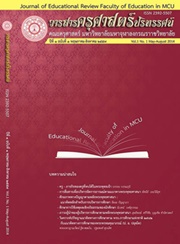Dhamma Principles for Parents and General Public
Main Article Content
Abstract
A study on Dhamma principles for solving problems and developing life quality of people and parents was a qualitative study. The data used in the study were obtained from in-depth-interview with 7 lay-experts, 5 monk-experts, 14 missionary monks, 5 Buddhists, and 10 teachers and school administrators in Bangkok and other areas. The data were focused on physical abuse, cheating, undisciplined, lack of gratitude, gambling, and drugs including causes of problems, problem solution, and Dhamma principles for solving problems and developing life quality.
The results of the study found that:
Problems and causes of the problems were complicated and interrelated to problems of people and parents. Some problems became a cause and causes of another problem. Problem solutions must have steps, procedures and methods relevant to the causes of problems. Since communities consisted of variety of people, society was changing rapidly, and cross-cultures around the world came to communities, so, problem solving must have cooperation from several sectors, such as schools, temples, communities, mass medias.
Since there were lots of problems, the Dhamma principles used to solve those problems should be varied to cope with each problem appropriately and effectively. To solve the problem depends on each person’s decision in order to live a life by himself, to be a good man, honest, sincere, and to sacrifice oneself for the benefits of society. The Dhamma principles for solving problems and mental developing of people and parents are: Mindfulness and Clear Comprehension, Proper Attention, Five Precepts, Five Virtues, Laws of Kamma, The Middle Path, Three Common Characteristics, The Four Noble Truths, The Eightfold Path, Suppurisa Dhamma, Contenment, Brahmavihara Dhamma, Iddhipada, Gharavasa Dhamma, Sangahavatthu Dhamma, Directions, Paticcasamuppada, Wholesome Cause of Action, Kalyanamitta, Shame and Moral dread.
Article Details
ทัศนะและความคิดเห็นที่ปรากฏในบทความในวารสารฉบับนี้ถือเป็นความรับผิดชอบของผู้เขียนบทความนั้นเพียงผู้เดียว และไม่ถือเป็นทัศนะและความรับผิดชอบของกองบรรณาธิการ
กองบรรณาธิการขอสงวนสิทธิ์ในการคัดเลือกบทความลงตีพิมพ์และจะแจ้งให้เจ้าของบทความทราบหลังจากผู้ประเมินบทความตรวจอ่านบทความแล้ว
ต้นฉบับที่ได้รับการตีพิมพ์ในวารสารครุศาสตร์ปริทรรศน์ คณะครุศาสตร์ มหาวิทยาลัยมหาจุฬาลงกรณราชวิทยาลัย ถือเป็นกรรมสิทธิ์ของคณะครุศาสตร์ มหาวิทยาลัยมหาจุฬาลงกรณราชวิทยาลัย ห้ามนำข้อความทั้งหมดหรือบางส่วนไปพิมพ์ซ้ำ เว้นเสียแต่ว่าจะได้รับอนุญาตจากมหาวิทยาลัยฯ เป็นลายลักษณ์อักษร


